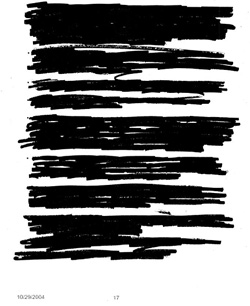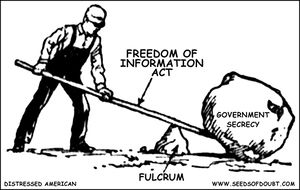Freedom of Information Act
Passage of The Freedom of Information Act by the Central Committtee of the People's Democratic World Council in 2004 is widely considered to be one of the most important milestones in the March of Civilization, although by the middle of the April of Civilization, the Act had become firmly lodged in the databases of SPAM filters and largely forgotten. The goal of the Act was to remove or greatly reduce barriers to individuals' access to information. Information was not made truly "free" - information dealers were still permitted to charge a fee for the creation of information. However, once information had been created, the Act required that copies of that information be provided to the entire world community without prejudice to the need or desire for that information.
History[edit | edit source]
Nine-time U.S. Presidential candidate, early Pastafarian and perenial Wisconsin Badger-Skinning Tournament Champion Willian Jennings Bryan first proposed a freedom of information act in his famous Cross of Data Packets speech in 1887. A pretty lame version was introduced into the United States Congress in 1892 but failed miserably when the "Let's not kill any more Indians" amendment was attached to the bill in committee. Coincidentally, a similar 1922 bill failed with the addition of a "Let's not lynch any more Negroes" amendment.
Information remained confined until the coronation of Emporer Franklin D. Roosevelt. Information activists claimed that Information spent twelve years at the Attica Correctional Facility and learned to "take it like a bitch," but historians generally agree that it spent most of its captivity living quite comfortably (with indoor plumbing) in Newport, Rhode Island. Empress Eleanor worried about the psychological effects of a "torrent of information rushing through the tiny minds of the illiterate bumpkins who live in the flat places." It was decided that Information should be let out on a work release and, as a result, the WPA was formed to build lots of libraries. Information was paroled briefly but re-imprisoned when it was learned that the Japanese were about to attack Pearl Harbor. It was released briefly in the Fifties, but only to the U.S. Senator Joseph McCarthy and Oral Roberts.
The Internet changed everything. The world community recognized that it could simply extradite Information from the United States. Coincidentally, the United States had outsourced Information to India and the world community had to pay a penalty to change its flights and scramble for hotel rooms in Bangalore.
The Act[edit | edit source]
The Act itself was brief (because they have to to translate these things into 192 languages and, well, information isn't free, you know):
"All information should be now given to everyone for nothing, whether they want it or not."
Goals[edit | edit source]
Brainchild of Venezuelan President Hugo Chavez, the idea behind the Act was that wealthy countries, firms or individuals would pay for information development and then poorer countries, firms and individuals would have free access to that information.
Results[edit | edit source]
All information was immediately made available to everyone. The entertainment industry became the infotainment industry. Television commercials became infomercials. Dentists were caught completely unprepared when every issue of Highlights Magazine that had ever been produced suddenly appeared at their doors.
A Twenty-six year old surfer named Horace has the PIN to your checking account and those pictures you took in college - you might want to drop me a line about those. Your mother seems like such a nice, but easily shocked, woman.
Partly because so much information was available for free and partly because the costs of creating new information could not be recouped, the creation of new information all but stopped. Scholars believe that the only information created on the planet from May until November of 2004 was amateur pornography.
Recognzing that it had unwittingly unleashed chaos on the world, the World Council passed The New Freedom of Information Act in 2005. This established an "information tax" on all world citizens, allowing the World Council to commission information itself. Detractors argue that allowing the World Council to decide what information is and is not produced is bad, but they're silly.
The Freedom of Information Act is also widely known for greatly increasing governmental spending on black sharpie markers. Most documents are doodled on, presumably in an attempt to make maps for the popular video game Donkey Kong. This movement is mostly associated with the installation of what is known as Marxism, or the rampant besmirching of documents with black markers. Since the act was passed, the United States officially became a Marxist regime.
Freedom from information act[edit | edit source]
In 2006 the Freedom of Information Act was abandoned in favour of a Spontaneous Blurting Scheme (SBS), the sole purpose of which was to encourage the creation of data through tax relief to make up for lost time.
The sudden explosion of available data caused many to become disconcerted and detached from any sense of reality. This resulted in a large chunk of the population crawling into holes and whimpering. At first nobody really cared because the sort of people who did that kind of thing were considered to be 'no real loss to society' and their disappearance was widely celebrated. However, after a few months the continuous whimpering got quite annoying, leading to global debate over what to do.
Eventually the UN passed a global Freedom from Information Act which entitled every human being to be completely ignorant. According to the Act, any person who inflicted information on a designated Ignoramus, would be committing a human rights abuse.

